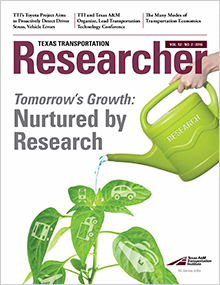When cars are able to talk to other cars and the road itself, our transportation system could be safer, less congested and a lot more efficient. Experts believe connectivity and automation can get us there.

Texas A&M University System Chancellor John Sharp wants to ensure this technology becomes a reality and that Texas A&M plays a chief role in transforming modern transportation. He announced a $150 million investment during the Texas A&M Transportation Technology Conference held at the George Bush Presidential Library in College Station, Texas, May 1–3.
Sharp’s vision calls for upgrading a 2,000-acre facility located just outside Bryan, Texas, that was once a U.S. Air Force base. Now called the RELLIS Campus — named for the Texas Aggie core values of respect, excellence, leadership, loyalty, integrity, and selfless service — the facility will include an expanded engineering and educational program. It will also be home to the development and testing of various connected and automated transportation technologies.

“We believe now is the time to transform this prime property into a premier campus dedicated to economic development and public-private partnerships,” Sharp told conference attendees, many of whom were representatives of private-sector companies like General Motors, Hyundai Motor, Toyota, IBM and Texas Instruments. “Among its other advantages, this will help accelerate the deployment of transportation technology through advanced research and education.” Also participating in the conference were Peloton Technologies, Bosch and Navistar.
Sharp also announced the creation of the Campus Transportation Technology Initiative designed to combine the efforts of Texas A&M, the Texas A&M Transportation Institute (TTI) and the Texas A&M Engineering Experiment Station (TEES).
“We believe we can offer the transportation industry and other public- and private-sector partners unique opportunities that no other university has to offer,” said M. Katherine Banks, vice chancellor and dean of engineering and director of TEES. “We are enthusiastic about creating a campus dedicated to moving research discoveries into the marketplace.”

The Campus Transportation Technology Initiative will create a test bed at the RELLIS Campus that allows the private sector to evaluate its products using the professional knowledge of Texas A&M personnel and university students.
“The level of expertise we can offer is unsurpassed,” said TTI Agency Director Dennis Christiansen. “We believe this will result in safer, more-effective solutions to the transportation challenges we face. The RELLIS Campus will create numerous opportunities to develop public-private partnerships of mutual interest in the transportation arena.”
Last year, Christiansen made it clear that TTI would be a major player in the advancement of connectivity and automation when he appointed Senior Research Engineer and Assistant Agency Director Christopher Poe to a new position as TTI’s connected and automated (CV/AV) transportation strategy lead. With 30 years of experience in transportation system operations and intelligent transportation systems, Poe has served as the vice chair of the Connected Vehicle Task Force for the Intelligent Transportation Society of America and secretary of the Transportation Research Board’s Vehicle-Highway Automation Committee. He is leading coordination of TTI’s CV/AV research efforts and serving as a liaison to all the other connected and automated transportation activities within The Texas A&M University System.

One of the top priorities in this new position was to hold this first-of-its-kind transportation technology conference at Texas A&M. “This conference was a great opportunity to open a discussion on how Texas A&M can work with the private sector to develop technology solutions that serve the needs of public agencies and consumers,” Poe says. “The partnerships going forward will allow Texas A&M to develop the facilities that help get technology, products and services to market faster and more successfully.”
Poe also noted that deploying CV/AV technologies holds the greatest promise for reducing crashes and improving the mobility challenges facing our transportation system. “The well-attended Transportation Technology Conference shows me that Texas A&M and TTI can serve an important role in bridging the solutions of the private sector with the needs of the transportation system owners and operators,” he says.

